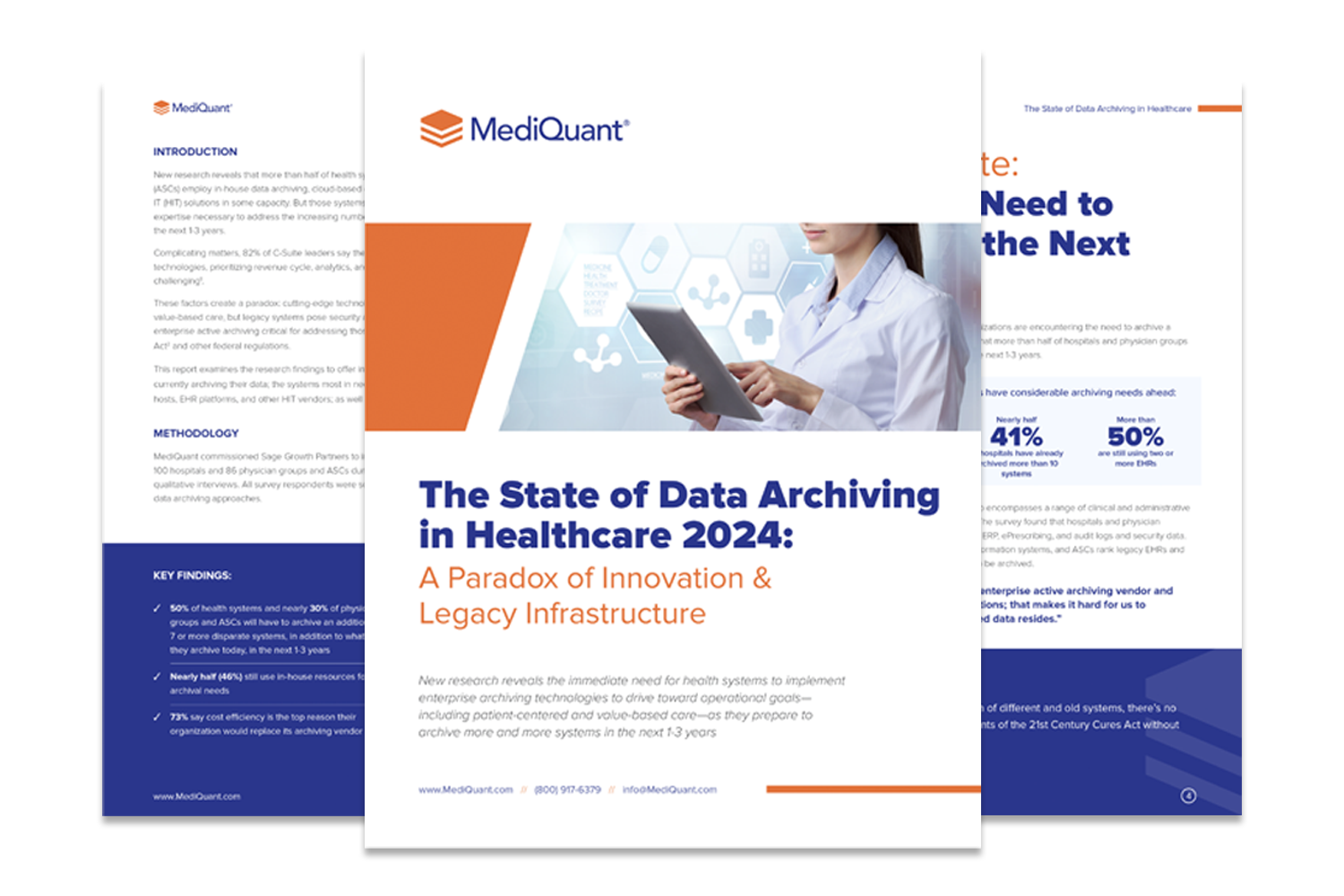Prisma Health began its archiving journey with MediQuant to preserve the financial and clinical records needed to meet regulatory requirements and to provide their clinicians with complete medical histories within their Epic EHR, accessible in one click.
In addition to achieving their clinical data goals, after completing more than 60 application archives, Prisma saves approximately $14 million annually in legacy maintenance and labor costs. The health system also recovered more than $100,000 in historic accounts receivable that would otherwise have been lost.
“With MediQuant, retiring our legacy systems has been seamless from an operational standpoint and a patient care perspective,” says Rich Rogers, Senior Vice President and CIO at Prisma Health. “I feel fortunate that we selected the right partner.”
Profile: Prisma is creating a better state of health
Based in Greenville, South Carolina, Prisma Health is a not-for-profit health system formed by the merger of Palmetto Health and the Greenville Health System in 2017. The health system has 18 acute and specialty hospitals, 2,827 licensed beds, 305 practice sites, and more than 5,200 employed and independent clinicians. Prisma Health’s goal is to create a better state of health by enhancing clinical quality, patient experience, and access to affordable care; by conducting clinical research; and by training the next generation of health providers.
Challenge: Preserve required financial, clinical data following merger
Following the creation of Prisma Health, leaders decided to standardize on the Epic EHR, which required moving from Cerner Millennium, explains Brenda Pickens, Director of Integration. That kicked off an ambitious archiving project to preserve clinical and financial data. Physicians want to access historic data in one place, without logging into multiple systems.
During the discovery process, Pickens and her team found out that MediQuant was already working on a Prisma project, subcontracted through Cerner, to archive a homegrown accounting system. After issuing an RFP, Prisma chose MediQuant to archive discrete data from their retired systems, while static data would move to an existing document storage system.
Solution: One vendor handles all archiving of discrete data
Prisma Health archives about five systems concurrently, starting new projects as others are nearing completion. Even at that pace, Pickens says they’re not quite halfway completed with archiving, as more medical practices join Prisma, and new projects are identified. Priority is based on the importance of the system, on when legacy contracts are ending, and on the expected server life for on-premise applications.
Pickens, who’s been with the organization for 27 years, leads a team of just over 50, including two archive specialists, four conversion specialists, and five in managed file transfer. Additionally, one person not in her department specializes in financial data.
At the beginning, there was a learning curve as Prisma discovered that archiving one system might require separate migrations for financial, acute care, and ambulatory data, for example. Pickens says that MediQuant staff are readily available to answer questions, troubleshoot issues, and offer advice. “The response rate is really good. If they don’t know something, they’re very open about it,” Pickens says. “They don’t try and sugarcoat anything. They tell it to us like it is and help us work toward a solution.”
Results: Projects continue to deliver tangible rewards
From 2018 to present, Prisma Health and MediQuant have completed 60 migration projects. Cost- cutting wasn’t a primary driver of the archive project, but Rogers estimates the health system saves approximately $14 million annually in maintenance costs and labor to keep legacy systems active. The health system retained more than $100,000 in historic accounts receivable that continue to be worked from MediQuant’s Data Ark.
In addition to financial benefits, DataArk delivers real value to clinicians with a tangible impact on patient care. Pickens relates the story of one vocal physician who was concerned about the accessibility of legacy clinical data. The team was patient, answered his questions, and made sure the requested data was in the archive. During the go-live period, the physician thanked the staff, saying the data retrieval process was much easier – even easier than with their original Cerner EHR. “And the best thing? We haven’t heard from him since,” Pickens says. “He goes into Epic and easily finds whatever he needs.”
Rogers, the CIO, expresses his appreciation for the MediQuant partnership. “MediQuant has delivered everything that we’ve needed, even as we’ve grown and merged and increased the number of systems that we’ve had to retire and archive.”
Advice for Others: Ensure vendor has experience with organizations like yours
Although Prisma Health had some experience with MediQuant through a relationship with Cerner, Pickens and her team still performed due diligence to make sure MediQuant was the right fit. “The ability to bring legacy financial and clinical data together in one system was attractive to the approving committee,” Pickens says. Her advice:
- Create selection criteria that reflects the goals the health system has for enterprise level archiving.
- Understand the difference between discrete data and static data and which is the right place to store each.
- Ensure a vendor partner has specific experience with hospitals of your size and complexity and can handle your entire application stack.
- Reach out to current customers to understand the experience: the good, the not-so-good, and how the vendor reacts to challenges and opportunities.
- Look for a vendor’s proven track record in archiving systems like yours and their understanding of each system’s data schema.
Results
- $14 million in annual maintenance and labor savings
- 60 completed migrations (so far)
- Preserved $100,000+ in revenue while archiving financial systems
- High user satisfaction, including physicians


